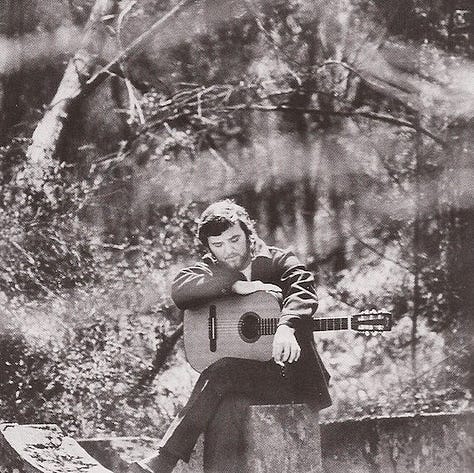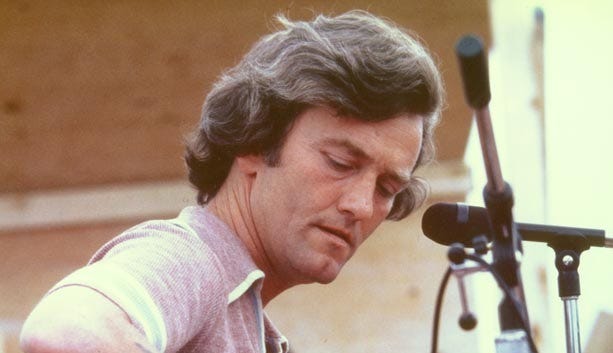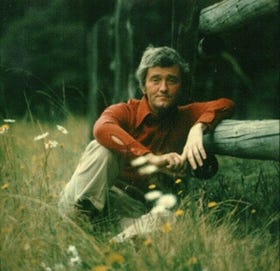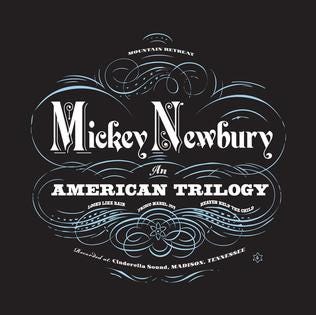Mickey Newbury
The Songwriter's Songwriter #1
Every now and then I’d like to regale you good people with a post about a songwriter who has had an immense influence on me. These guys and gals have taught me so much about music and deepened my love and appreciation for it to the extent that I feel like I’m hiding something if I don’t share them. These will appear in the order of whenever I happen to think about them. This isn’t a contest and there’s no ranking.
Having said that, Mickey Newbury might win if it was a contest.
“I would sooner be robbed by a fan than a company. The fan may be broke and have but one choice. There is no excuse for the way the "songwriter" is robbed by everyone from the record company to the broadcaster, by the pure bottom line, greed. If it continues, sadly, in time, the music will suffer. It takes many many years to learn how to write a song properly. Songwriters will be forced to hit the road in order to make a decent living and, in my opinion, these two careers are related but not compatible.” —Mickey Newbury
Sometimes the unsung carry the torches through the darkest nights and no one knows them or thinks much of them, yet without them we’d lose the light. Brian Eno or Peter Buck, maybe said that “the first Velvet Underground album only sold 10,000 copies, but everyone who bought it formed a band,” and that’s the point I’m trying to make here; Mickey Newbury is like the Velvets in a lot of ways. The difference though is that Newbury wasn’t a cult hero, he was the template for every aspiring songwriter in Nashville at one time.
In 1968, Newbury had four top-five songs across four different charts: "Just Dropped In (To See What Condition My Condition Was In)" #5 on the Pop/Rock chart by Kenny Rogers and the First Edition; "Sweet Memories" #1 on Easy Listening by Andy Williams; "Time is a Thief" #1 on the R&B chart by Solomon Burke; and "Here Comes the Rain Baby" #1 on the Country chart by Eddy Arnold. No one else has managed to pull this off since then and it’s unlikely anyone ever will again.
His career as a songwriter begain in the early 1960s, with 353 covers of his songs by country, pop, blues, R&B, and symphony artists. This is about one cover every 6 weeks for 36 years. Although he wrote over 500 songs and everyone from Willie Nelson to Joan Baez to B. B. King to Kenny Rogers all recorded Mr. Newbury's songs, he remained largely unknown outside of the music industry. Newbury actually quipped once that he was most famous for not being famous.
Nowhere is this sad reality more poignant than in the lyrics to Waylon Jennings’ smash 1977 hit “Luckenbach, Texas (Back to the Basics of Love)” with the lines "Between Hank Williams pain songs, Newbury's train songs and blue eyes crying in the rain,” which namedrops household names next to Newbury’s.
When my buddy Daniel Presnell sent me Newbury’s record Frisco Mabel Joy sometime around when he moved to Canada and thought I should hear these songs as I remained in the deep south we were both raised in I was immediately smitten. Especially the album opener and spiritiual core of the record, “An American Trilogy,” a medley of three 19th century songs: “Dixie” a blackface minstrel song composed by Daniel Decatur Emmett that became the unofficial anthem of the Confederacy since the Civil War; "All My Trials,” originally a Bahamian lullaby, but closely related to African American spirituals and well known amongst folk revivalists; and "The Battle Hymn of the Republic,” the marching song of the Union Army during the Civil War. According to Joe Ziemer's Newbury memoir Crystal & Stone, Newbury was moved to perform the song—which had been banned by southern radio stations—as a protest against censorship.
“An American Trilogy,” oddly enough was a spontaneous creation that occurred onstage, Newbury says. He remembers it was at the Bitter End in Los Angeles. He had worked out a quarter-time, or ballad arrangement, of “Dixie.” But when he was onstage and had given himself over to the music, “Dixie” flowed into “Battle Hymn of the Republic” then merged with “All My Trials.” He remembers looking at folk singer Odetta who was seated in the front row and seeing tears on her cheeks. He changed a song that some considered divisive into a song of unification.
—Dorothy Hamm, American Songwriter Magazine
You can learn everything worth learing about songwriting by spending some serious time exploring Newbury’s songs but the Texan was known to elaborate in interviews on his creative process1: adding a layer of understanding to his creativity that a lot of artists simply don’t provide us.
“A songwriter writes because he has to,” Newbury says. “There are some people who write for the money; and that’s okay. But if there wasn’t a penny in it, I’d still write.”
“The most difficult part of creating is distracting the analytical part of the brain which tends to get in the way of the creative side. The spatial side wants to create, but it can’t. It’s just an editor. I’ve told friends who were having trouble writing to get in their car and drive 1000 miles and they’ll write. Then the analytical part of the brain, the part that usually edits what you say and think, is occupied with driving.”
“I think sleep deprivation is also a very good way to tap into the creative part of the brain. I know a lot of writers who thought pills – uppers – would help them write. Once they figured out that it was just going without sleep, they didn’t need the pills anymore.
“I work on batches of songs at one time,” Newbury continues. “I never throw anything away. I’ll go back and pick it up maybe years later and I might write a verse. When you write like I write, emotions don’t change. I’m still writing songs about romances I had in my 20s. I write real fast, but when it stops, no sense belaboring it. I kind of hear a finished song in my head. When I stumble over a lyric I know it’s not right and I put it down.”
“Basically I love words and melody is just a frame for the lyric. I might put several sets of lyrics to one melody.”
“Every line better be a hook line or it’s not a good song.”
But you don’t have to take my word for it. Kris Kristofferson: “God, I learned more about songwriting from Mickey than I did any other single human being. To me he was a songbird. He comes out with amazing words and music... I’m sure that I never would have written Bobby McGee, Sunday Morning Coming Down... if I had never known Mickey. He was my hero and still is.”
An American Trilogy





https://americansongwriter.com/mickey-newbury-the-song-poet/



